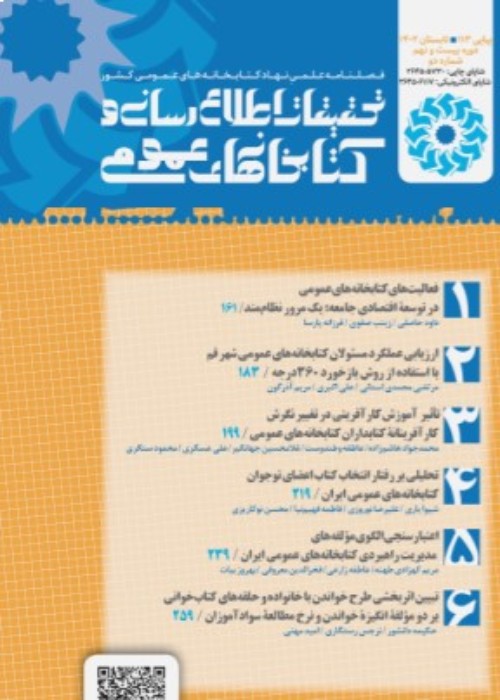Investigating the extent of using entrepreneurship components in children’s storybooks
Given the significance of entrepreneurship training in fostering and promoting entrepreneurship as well as the appropriateness of childhood for its acquisition, entrepreneurship is seen as a crucial skill for children. Therefore, seeking techniques which help children acquire this skill is highly recommended. As children’s literature, particularly storybooks, play a significant role in entrepreneurship training, paying attention to its components becomes more crucial. The purpose of the present research is to explore the extent of the use of entrepreneurship components in children’s storybooks of age group ‘C’.
The current research employed a ‘content analysis’ method and was ‘applied’ in terms of purpose. The research population consisted of 80 storybooks that were selected by the Children’s Book Council for the age category ‘C’ during the years 2018–2020. Out of these, 30 storybooks were selected as the research sample using a simple random sampling procedure. Theses storybooks were examined by a researcher-generated checklist. As for content validity, ten psychology department faculty members were asked to assess the checklist. After receiving their feedback, the content validity ratio index as well as content validity index were calculated, and the initial checklist was revised. As for the reliability of the checklist, 10% of all the storybooks were randomly selected and reviewed by two evaluators. The checklist was completed for these books. The percentage of agreement among the opinions of the evaluators was then verified by computing Scott’s pi coefficient. The coefficient value of 0/94 showed that the checklist had an acceptable level of reliability. Six entrepreneurship components and 40 sub-components made up the final checklist. Finally, SPSS was used to analyze the data collected via the checklist.
The overall rate of employing entrepreneurship components in the selected storybooks was 38/9%. Based on the Friedman Test results, there was a significance difference between the priority of the entrepreneurship components, with ‘creativity and innovation’ and ‘need for success’ being the most frequently used components, followed by ‘need for independence’, ‘risk-taking’, ‘ambiguity tolerance’, and ‘locus of internal control’ respectively. At the population level, on average, each entrepreneurship component received the following amount of attention: creativity and innovation (36/5% to 57/5%), need for success (33/8% to 53/5%), need for independence (28/6% to 52/6%), risk-taking (26/5% to 48/5%), ambiguity tolerance (22% to 44/4%), and locus of internal control (22% to 37%). Furthermore, out of 30 storybooks reviewed by the evaluators, only seven covered more than half of the entrepreneurship components, thus were considered among the rich and suitable storybooks for entrepreneurship training. The story of ‘Pushka’ was discovered to be the richest storybook in terms of the use of entrepreneurship components.
Originality/value:
For the first time, entrepreneurship components in children’s storybooks were examined in this study. The results of this study can serve as a guide for authors to create books for teaching entrepreneurship to children. Moreover, the valuable storybooks identified in this study in terms of entrepreneurial components can be recommended to educators, parents, and librarians as books suitable for teaching entrepreneurship to children.
- حق عضویت دریافتی صرف حمایت از نشریات عضو و نگهداری، تکمیل و توسعه مگیران میشود.
- پرداخت حق اشتراک و دانلود مقالات اجازه بازنشر آن در سایر رسانههای چاپی و دیجیتال را به کاربر نمیدهد.



